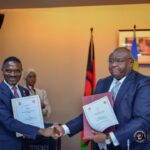Kenya is in advanced talks with the United Arab Emirates (UAE) to secure a $1.5 billion loan as part of its efforts to stabilize its economy and meet pressing financial needs. The loan, which comes with an interest rate of 8.25% and a seven-year repayment period, is seen as a more favorable option compared to the Eurobond loan, which currently carries a higher rate of 10.7%. This was revealed by Kenya’s Finance Minister John Mbadi, who spoke to local media about the government’s ongoing negotiations.
Mbadi emphasized that while the loan terms from the UAE appear to be more affordable, the decision has raised concerns, particularly from the International Monetary Fund (IMF). The IMF has expressed reservations about Kenya taking on a commercial loan, especially one that is dollar-denominated, given the potential risks this poses to the country’s economic stability. “There are issues to be discussed, including with the IMF, which had expressed some reservations, because we are talking about this being an external loan and is dollar-denominated, it may expose us to additional risk,” Mbadi stated during a recent press conference.
The Kenyan government’s move comes at a time when the country is grappling with high debt levels and a strained fiscal environment. In recent years, Kenya has turned to various sources of external funding to support its infrastructure projects, manage public sector wages, and stabilize its currency. However, these external loans, especially those denominated in foreign currencies, have left the country vulnerable to exchange rate fluctuations, which could drive up the cost of debt servicing.
Amid these discussions, President William Ruto has also weighed in on the broader issue of global financial institutions and their role in supporting developing nations. Speaking at the Summit of the Future at the United Nations General Assembly in September, President Ruto criticized multilateral organizations like the IMF and the World Bank, arguing that their structures are outdated and ineffective in addressing the unique challenges faced by countries in the Global South. According to the president, these institutions are ill-equipped to manage the complex issues that developing nations face, and instead, they often exacerbate economic problems.













Leave a comment